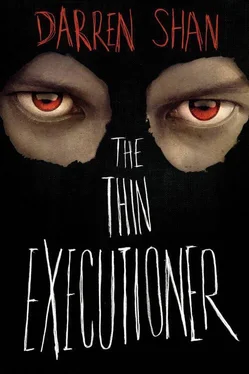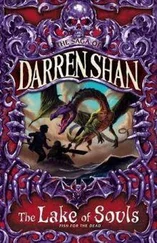It would be another few days before Jebel discovered what work entailed. They proceeded slowly, the traders in no rush.
Apart from an extra pair of socks and a cap, Bush and Blair gave Jebel no new clothing. They freed his arms sooner than they’d threatened, and he had to clap his hands together constantly while walking, and rub them up and down his sides to stop himself freezing. His teeth chattered, and he shivered so badly that he found it hard to hold a flask steady when he was drinking. At night when they lit a fire, he’d huddle as close to it as he could and fall asleep sitting up, extracting every last flicker of heat from the dying embers.
Finally, after a week of aimless wandering, they came to a town. Like Jedir, it was fortified. When Bush and Blair saw it, they consulted one of their many maps and discussed their plan in whispers, then skirted the town and made camp at the base of a hill. Not lighting a fire, they sat wrapped in furs, waiting for dark, while Jebel jumped up and down and slapped his sides, trying to keep warm.
They broke camp when night fell. The moon was almost full, so it was easy to find their way. Jebel expected the pair to head for town, but instead they circled around to the north to a graveyard surrounded by a fence topped with thorns, nails, and wicked-looking spikes.
Bush and Blair stopped by the rear gate once they had completed a circuit of the graveyard. The larger Abu Saga graveyards were guarded, but this one wasn’t — the people of the town must have had insufficient funds to stretch to a full-time guard of their dead and instead relied on the fence to keep out intruders. Jebel heard Blair mutter, “Do you think it’s worth our while?”
Bush replied, “We might as well try it while we’re here. Besides, it will be an easy start for the boy.”
The gate was locked with four lengths of chain, but Bush produced a bunch of long needles and went to work on the locks, snapping them open one after the other. When the last had been dealt with, he pushed the gate open and entered. Blair shoved Jebel in, hurried after him, then swung the gate closed behind them.
The graveyard was a dark, eerie place. Trees blocked out most of the moonlight, and the snow didn’t lie as thick here as it did outside. There were no headstones, only mausoleums.
Bush and Blair strolled through the graveyard. Bush was whistling softly and Blair was humming. Jebel recognized the tune, an old ballad, “The Merry Dance of the Dead.” He didn’t like it here and hoped they wouldn’t stay long. But why enter in the first place? Were they meeting someone? Did they plan to perform some dark rite involving the spirits of the departed?
They stopped by one of the largest mausoleums. There were no names on it, but the faces of the dead had been carved on a plaque on the eastern side of the tomb. There were five of them, all men. No women were buried here. Women were second-class citizens in Abu Saga and were hardly ever afforded the luxury of a burial when they died.
“A glum bunch,” Blair noted, studying the five carved, stern faces.
“But wealthy,” Bush mused, then tapped the side of the mausoleum with his foot. “Up you go.”
Jebel stared at the trader. “Up where?” Bush pointed to the roof. “What for?”
Blair kicked him. “You’re not here to ask questions. Get up there quick, or we’ll leave you behind when we go — with the rest of the dead!”
Jebel judged the height of the roof, then jumped and grabbed for the edge. It was covered in snow, and his fingers slipped. He tried again, but the same thing happened. “I’ll need a leg up,” he said.
Bush locked his hands together and bent. Jebel put his right foot on the hands, bounced a couple of times, then jumped. Bush pushed and Jebel landed on his stomach. He started to slide off, but Blair grabbed his legs and thrust him forward. When Jebel was secure, he stood shakily and looked around. The graveyard was even creepier from up there.
“What now?” he asked, eager to finish whatever business they were here for.
“There should be a small window in the middle of the roof,” Bush said.
“I can see only snow,” Jebel said.
“Then edge forward on your hands and knees until you find it,” snapped Blair.
Jebel advanced slowly, scraping snow out of his way, tapping the roof. He soon found the window and cleared the snow from it. It was circular. The glass was stained with various colors, but he could see through it into the tomb. There were five large coffins within, made of stone and metal.
Jebel retreated to the edge of the roof and told Bush and Blair what he’d found. “Very good,” said Blair. “You’re not a complete idiot. Now for the next step…”
“Perhaps a little information about Um Saga burial practices would be useful at this point, Master Blair?” Bush suggested.
“Why not?” Blair grinned. “Many people think that the Um Saga are godless, as most of them don’t openly worship any higher force. That isn’t actually the case. They do have gods, and they believe in an afterlife, but they think that you have to buy a place by the side of your favored deity. The rich get to enjoy the trappings of the next world, while the poor fade away to nothing when they die.
“To ensure his place in the afterlife, an Um Saga must be buried in style, with rings, gems, gold-headed canes, bracelets, that sort of thing. The riches act as a heavenly bribe. That’s why there are only mausoleums here — the poor are simply dumped in an unmarked hole and left to rot. There’s no middle ground in Abu Saga.”
“It seems harsh to civilized folk like us,” Bush murmured, “but I suppose it acts as a powerful incentive to make the most of your opportunities in this life.”
“Violations of crypts are rare,” Blair went on. “The Um Saga are savages, but they have great respect for their wealthy dead — they look upon them the same way that your people look upon their famous warriors and executioners. To help protect the dead from foreign thieves, they never talk of the buried treasures with anyone who isn’t Um Saga. The gods are supposed to strike down dead those who make mention of their customs to an outsider.”
“But even the wrath of the gods can’t deter some loose tongues,” Bush chuckled. “We learned of these treasure troves fifteen years ago, from a not-so-dearly departed colleague. We’ve made a pilgrimage here most years since, always in winter, when people are less inclined to visit the dead — meaning they usually only discover evidence of our raid long after we’re gone.”
“Even if they discover it sooner,” Blair said, “they’re less likely to give chase when winds are blowing and snow is falling.”
The pair smiled at Jebel. He’d turned as cold inside as he was without. “No,” he croaked. “I won’t do it. I can’t.”
“Of course you can,” said Bush. “The windows are normally too small for Master Blair and me. We have to chip out part of the roof around them. You, however, should be able to fit through easily, being so thin.”
“No,” Jebel said again. “I won’t disturb the sleep of the dead. The gods would condemn me.”
“What do the gods care about Um Saga?” Blair snorted. “Come on, boy, it’s not like we’re asking you to desecrate the tombs of your own people.”
“Please,” begged Jebel. “I’ll do anything else. Or you can sell me. But don’t—”
“You wouldn’t bring ten silver swagah,” Bush hissed. “And we’ve no other use for a sniveling Um Aineh brat. So it’s this or we slice you up into pieces and leave your scraps for the vultures.”
“You wouldn’t be the first child we’ve killed,” said Blair coldly.
“But I won’t be able to get out,” Jebel cried. “I’ll be trapped.”
Читать дальше







